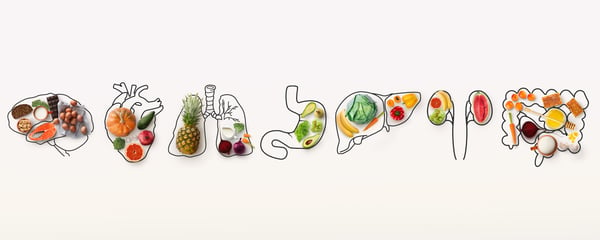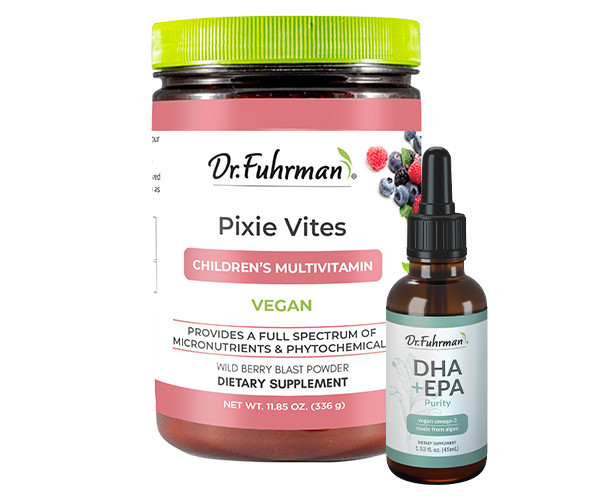Benefits
Optimize your child's health with Dr. Fuhrman's Pixie Vites Chewable, meticulously crafted to provide the essential nutrients kids need to grow up healthy, plus a boost of superfoods. Each serving is packed with critical vitamins and minerals, with a fun berry flavor. Children don't eat perfectly healthfully all the time, and Pixie Vites provides added insurance that they're getting the vitamins and minerals they need to grow up healthy.
Jar contains approximately 120 scoops (120-day supply for children 1-3 years, 60-day supply for children 4-10 years)
- Essential vitamins and minerals to fill in the nutritional gaps in children's diets
- Contains folate, not folic acid
- Support brain and nervous system function with vitamin B12
- Build healthy bones and support immune function with vegan vitamin D3
- Vitamin E as natural mixed tocopherols, unlike most supplements that use alpha-tocopherol only
- Support thyroid function with iodine derived from kelp
- Support immune function with zinc
- Additional phytochemicals and antioxidant benefits from our organic fruit and vegetable blend, including cruciferous vegetables like broccoli sprouts and kale, goji berry extract, carrot, beet, blueberry, and raspberry
- Meticulously researched, ensuring they are free from potentially harmful ingredients like vitamin A or folic acid
- Vegan; does not contain gluten, dairy, soy, or GMOs
- No added sugars, artificial flavors, or artificial colors
Key Ingredients
Vitamin D3
Benefits: Once thought to be important only for calcium absorption and bone health, scientists have now found that vitamin D has important actions throughout the body, and low vitamin D levels are associated with diminished immune function, several cancers, diabetes, cardiovascular disease, and autoimmune diseases.
Why we should supplement: Many people have insufficient vitamin D levels. Even children who spend a lot of time outside might not have adequate vitamin D levels, since sun protective clothing or sunscreen is necessary to protect their skin. Supplementing is the best choice for achieving adequate vitamin D levels. Pixie Vites supplies vegan vitamin D3; D3 is more effective than D2 for raising 25(OH)D levels.
About our D3: The vegan D3 in Pixie Vites is derived from lichen sourced from the UK.
Folate (not folic acid)
Benefits: Folate is important for DNA synthesis, cell division, and amino acid metabolism.
Why kids should supplement: Since many children likely don't eat sufficient green vegetables to provide adequate folate, a natural form of folate is included in Pixie Vites.
About our folate: Tetrahydrofolates are the biologically active forms of folate. Synthetic folic acid, on the other hand, is not an active form, and must be modified before it can be used by the body as folate. Pixie Vites supplies 5-methyltetrahydrofolate, a common form of folate found in natural foods and circulating in the blood.
Vitamin B12
Benefits: Vitamin B12 is required for red blood cell production, nervous system function, and DNA synthesis. Deficiency in B12 can cause a variety of health problems, including anemia, depression, confusion, fatigue, digestive issues, and nerve damage.
Why kids should supplement: Since B12 isn't naturally present in plant foods, children on plant-based diets should supplement.
About our B12: We use methylcobalamin, one of the natural forms of B12 used in the body. Since research suggests we absorb only a small proportion of the B12 ingested, Dr. Fuhrman recommends taking a larger dose than the DV.
Iodine
Benefits: Iodine is required for the body to produce thyroid hormones.
Why kids should supplement: Most plant foods are low in iodine, and iodized salt is the main dietary source. If you and your children follow a vegan or near-vegan diet, especially if you avoid adding salt to your food, your iodine intake is probably low.
About our iodine: Our iodine is derived from Atlantic kelp sourced from Canada.
Zinc
Benefits: Zinc is essential for immune function, growth, and reproduction, and supports hundreds of chemical reactions.
Why kids should supplement: Zinc is abundant in whole plant foods but is not readily absorbed. Beans, whole grains, nuts, and seeds contain zinc, but also contain substances that inhibit zinc absorption. Zinc intake and circulating zinc levels are lower in vegetarians and vegans, and zinc requirements for those on a completely plant-based diet are estimated to be about 50 percent higher than the standard recommendations.
About our zinc: Pixie Vites supplies zinc as zinc picolinate and zinc amino acid chelate. Chelated forms such as these increase zinc absorbability.









